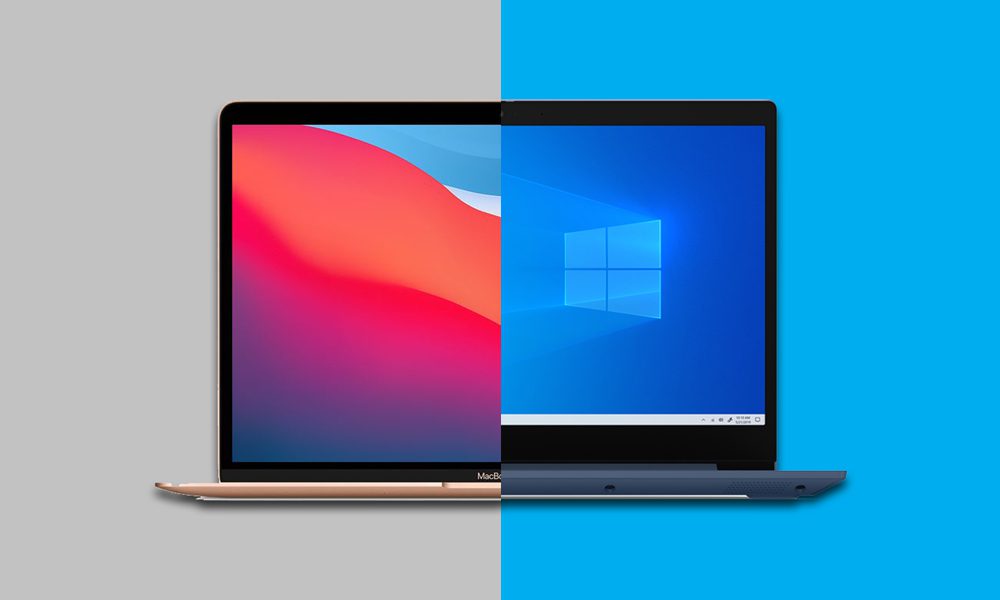If you’re planning to buy a new computer, the first decision you have to make is whether you want a Mac or a Windows PC. While it comes down to personal preferences, you might want to get a Mac if you are looking for a safe and easy-to-use computer that is durable, sleek, and works with your iPhone. On the other hand, if you’re looking for a cheaper computer that you can upgrade, customize, and use to play games, you’ll want a Windows PC. Here’s everything you need to know about the difference between Mac vs PC, and which one is better for you and your needs.
Mac vs PC: User Interface
Winner: Mac
One of the biggest differences between a Mac and a Windows PC is with the user interfaces. With its clean and simple user interface, macOS is designed to be more user-friendly. On the other hand, Windows PCs have a more blocky and old-school design that some users find to be difficult to navigate.
This becomes apparent when you look at the changes Microsoft recently made to its operating system to look a lot more like macOS. Windows 10 has rounded corners, colorful app icons, new transparent widgets, and other modern designs that look very similar to Macs.
Read More: The best features you’ll get when you upgrade to Windows 11
Mac vs PC : Ecosystem
Winner: Mac
While it might sound backward, you might want to choose your next computer based on what kind of phone and other devices you already have. If you have an iPhone, and you use it more than your computer, it’s probably a good idea to get a Mac. And, likewise, if you have an Android, you might want to get a Windows computer.
You can mix and match operating systems, but Apple devices generally work better together. For example, macOS makes it easy to back up your iPhone, add songs to your iPad, unlock a Mac with your Apple Watch, and more.
On the other hand, Android does work better with Windows computers. However, since Android is made by Google and Windows is made by Microsoft, they will not work together as seamlessly as Apple products will.
Mac vs PC: Security
Winner: Mac
When it comes to security, a Mac is generally safer than a Windows PC. One reason for this is because Apple tightly controls the hardware and software of its Mac computers, while Microsoft has more of a hands-off approach.
For example, Macs have a security feature called Gatekeeper, which blocks you from downloading any applications that have not been reviewed and verified by Apple. This will prevent you from downloading any applications that have been infected with malicious software (malware).
Another reason Macs are generally considered to be less vulnerable is due to the fact there are a lot more Windows PCs out there. According to the most recent data from the International Data Corporation (IDC), Macs only make up around 7.4% of all computers sold across the world. So, from a cybercriminal’s perspective, there are more opportunities to profit from targeting Windows computers over Macs.
However, as Macs become more popular, cybercriminals have been increasing their rate of attacks. In fact, threats targeting Macs surged by 1,000% in 2020, according to the most recent data from AV-Test. Still, the record-high 673,000 Mac threats pale in comparison to more than 90 million threats targeting Windows users that same year.
Read More: How to prevent your Mac from getting infected with malware
Mac vs PC : Apps and Compatibility
Winner: PC
Since Apple focuses so much on privacy and security, there are some apps that are not available for Mac users. You can still find millions of apps that will work with a Mac, but there is a larger library for Windows PC users.
While there are more apps available on Windows PCs overall, there have been some apps for graphic designers, video editors, and photographers that were exclusive to Mac users for years. However, that is not so much the case anymore, as programs like Adobe Photoshop and Illustrator are now available on PC as well. Plus, creative types might find a touchscreen laptop more enticing, which Apple does not offer.
Windows PC users will also have more options when it comes to peripherals like webcams, keyboards, printers, monitors, and more. More devices are compatible with Windows and made for PC users. For example, most wireless keyboards will feature a “Control” key for PC users instead of a “Command” key for Mac users. However, the vast majority of devices will work with both operating systems just fine.
Mac vs PC: Gaming
Winner: PC
If you are looking to play the latest AAA games, almost all of them will be available for PC users, but only a few will be supported on Macs. This is because Microsoft makes Xbox, Windows PCs are much more popular, and they usually come with better graphics cards.
While newer Macs are powerful enough to handle games, developers have always made major games for Windows PCs. For example, there are around 13,500 Mac games on Steam, while there are nearly 60,000 games that work with Windows PCs.
Mac vs PC: Upgrade and Repair
Winner: PC
A PC is much easier to upgrade and repair than a Mac because PCs are made of interchangeable components. If you know what you’re doing, you can easily swap out the RAM, hard drives, GPU, CPU, and even the motherboard.
This means you can upgrade the memory when your computer starts to slow down or add a new hard drive when you run out of storage space. And, if one component is damaged or fails, you can replace one part instead of buying a whole new computer.
Read More: What is RAM, and how much memory do you really need?
While there are some Macs that allow you to upgrade the RAM and storage, the new models don’t let you replace anything. Since Apple started making its own processors, it has moved to a “system on a chip” (SoC) architecture, which means the CPU, GPU, and RAM are all on the same chip.
So, once you buy a Mac, you will be stuck with the specs that you have, and the only way to upgrade your computer is to buy a new one. And, since Apple likes to solder all the components down in order to save space and reduce power consumption, you will not be able to upgrade or repair one yourself.
However, since Apple has such tight control over all aspects of the Mac, the company can provide much better customer service. While Apple usually charges a premium for its services, the company has held the highest customer satisfaction rating of any computer company for the past five years, according to a 2020 report from the American Customer Satisfaction Index.
Mac vs PC: Price
Winner: PC
When it comes to price, Windows PCs almost always give you more bang for your buck. For example, the cheapest laptop that Apple currently sells starts at $1,000, while you can find comparable PCs for half that price or even less.
No matter what your budget is, there are thousands of Windows PCs to choose from. You can get a Chromebook for $100, or you could spend as much as you want building a custom PC. On the other hand, there are only a few different Macs that you can find on the Apple Store at any time.
Every Mac model currently available on the Apple Store (Image Source: Apple)
The cheapest Mac you can buy on the Apple Store now is the Mac Mini at $699, which doesn’t come with a screen, keyboard, or mouse. Then Mac laptops start at $1,000 for the most basic model, with the most expensive model costing more than $6,000 with fully maxed-out specs. And, if you’re looking for a traditional desktop tower, you could pay more than $50,000 for the Mac Pro (not including the $6,000 companion monitor).
However, Macs are more expensive for a reason. Many PC manufacturers will resort to using plastic parts in order to reduce costs, but Apple always uses premium materials like aluminum and glass. This means Macs usually look better, and they are also more durable. So, a Mac might actually end up costing you less over time.
If you’re currently looking to buy a new computer, and you don’t know where to start, check out our laptop buying guide.




